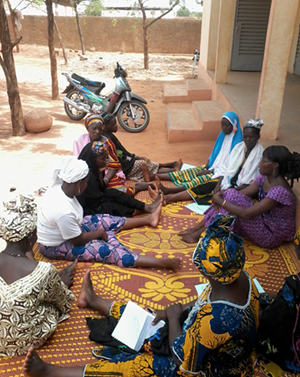
As part of our work to improve the nutritional status of women of reproductive age, pregnant and lactating women, and children under two years of age in Mali, SPRING promoted adoption of essential nutrition and essential hygiene actions (ENA/EHA). We adapted the 2008 Government of Mali-approved essential nutrition actions policy to include EHA, building a curriculum for training facility staff and community agents.
Overall, SPRING/Mali trained staff from 33 health facilities in ENA/EHA and led nutrition-specific and nutrition-sensitive community interventions in 20 communities in Feed the Future’s zone of influence in Mopti. A total of 75 facility-based staff and 300 community-based staff were trained, and they went on to form 200 ENA/EHA support groups. SPRING also integrated the ENA/EHA into our farmer nutrition school (FNS)–reaching 5,500 people–and our community-led total sanitation (CLTS) activities.
The actions promoted in both ENA and EHA have been around for some time, and SPRING capitalized on the existing programming knowledge to promote the benefits of behaviors throughout the “life cycle,” not just limited to the first 1,000 days.
In 2011, the CORE Group highlighted seven essential nutrition actions: women’s nutrition, exclusive breastfeeding from birth to six months, complementary feeding from 6 – 23 months, feeding during illnesses, addressing vitamin A deficiencies, preventing and controlling anemia, and preventing and controlling iodine deficiency disorders.
The essential hygiene actions added by SPRING to the essential nutrition actions include: household treatment and safe storage of drinking water, handwashing at five critical times, safe storage and handling of food, safely disposing of feces, and creating clean areas free from animal feces for toddlers.